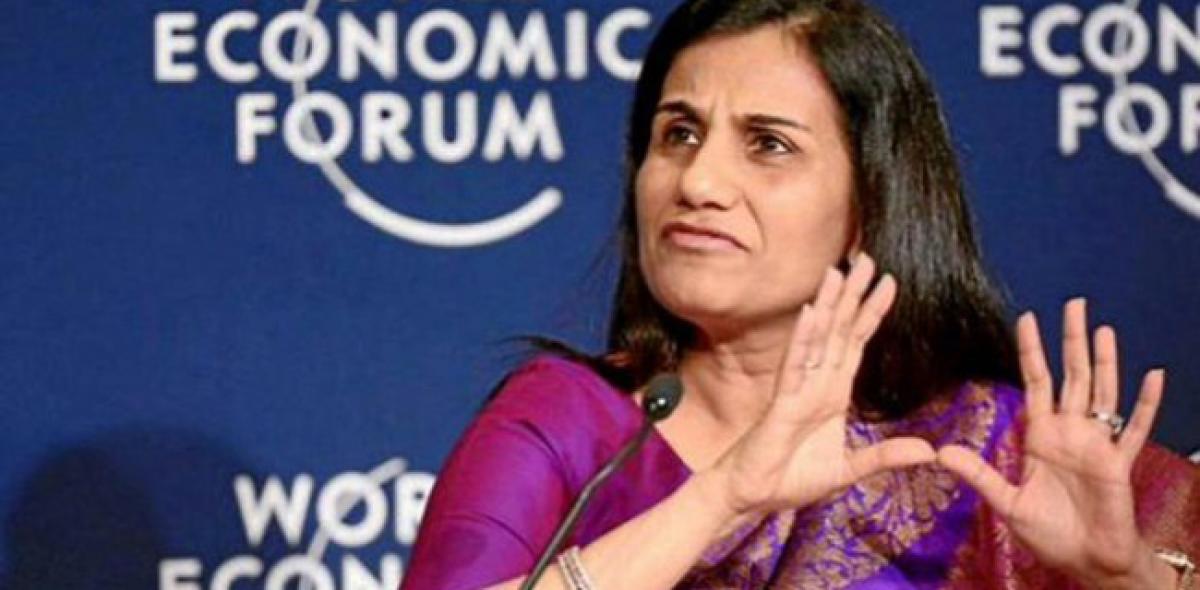Live
- Lokesh fiat on MSME applications
- CM sets administrative goals at Collectors’ Conference
- ADB okays ₹8K cr to develop Amaravati
- Pushpa 2 Hits ₹1000 Crore in 6 Days: How It Compares to Other Top Indian Films
- NASA Tracks Five Giant Asteroids on Close Approach to Earth Today
- Vivo X200 and X200 Pro Launched in India: Price, Specifications, and Features
- Nitin Gadkari Admits Feeling Embarrassed at Global Summits Over Rising Road Accidents in India
- Comprehensive Review on Indiramma Housing Survey and Welfare Initiatives Conducted via Video Conference
- Jogulamba Temple Records Rs 1.06 Crore Hundi Revenue in 150 Days
- Opposition Slams ‘One Nation, One Election’ Bill as Anti-Democratic; BJP Allies Support the Move
Just In

ICICI Bank is no ordinary bank. It is a systemically important giant bank. It is the torch-bearer of private sector banks in India. ICICI Bank is no ordinary corporate entity.
ICICI Bank is no ordinary bank. It is a systemically important giant bank. It is the torch-bearer of private sector banks in India. ICICI Bank is no ordinary corporate entity. It accounts for almost 2% of India's market capitalisation and Foreign Investors hold almost half of its share capital. Any loss of investor confidence in the Board or Corporate Governance of ICICI Bank will have larger implications in attracting foreign portfolio investments for Indian capital markets as a whole.
In such a bellwether organisation, first of all there should not be an occasion to make any allegations against the integrity of the CEO of the organisation. When allegations, with authentic narration of chain of quid pro quo transactions, were made by a whistle-blower, the board of ICICI Bank should have acted with utmost concern from the word go and should have been seen to be acting with great fiduciary responsibility.
The ICICI Bank board should have assured the investors of the robustness of board governance by ordering an immediate and impartial enquiry, internal or external, into the allegations. The board also should have asked its CEO to immediately step aside for the very simple act of omission of not disclosing her conflict of interest in the loan transactions of Videocon group, irrespective of the merits in the quid pro quo allegations.
Videocon Group chairman Venugopal Dhoot is said to have invested in NuPower Renewables Pvt Ltd, the company founded by ICICI Bank CEO Chanda Kochhar's husband Deepak Kochhar, by extending a loan of Rs 64 crore through a firm owned by him. Subsequently, "masked" share transfer of this firm was done to a trust called Pinnacle Energy, whose trustee is Deepak Kochhar, for just Rs 9 lakh after Videocon group secured the loan from ICICI Bank.
The facts narrated in the above chain of transactions have not been rubbished either by Kochhars or Venugopal Dhoot. The speed with which ICICI Bank's board chairman M K Sharma rushed to defend its CEO Chanda Kochhar, soon after the allegations of quid pro quo in Videocon loan case became public in March 2018, without any reference to the merits or otherwise of the allegations, smacks of a paternalistic protection offered by a feudal lord. ICICI Bank board painted itself with grey colours in the eyes of its investors spread across the globe.
On March 28th, he stated that “the board has come to the conclusion that there is no question of any quid pro quo/ nepotism/ conflict of interest as is being alleged in various rumours. The board has full confidence and reposes full faith in the Bank’s MD and CEO Ms. Chanda Kochhar.”
At last the ICICI Bank board has belatedly acted now, asking its CEO to go on leave till a probe into her conduct by an independent agency is completed and mandated an external committee headed by a retired supreme court judge to investigate into the allegations.
These are basic actions expected from any responsible board of a large public institution, but were taken only after a delay of three months during which period the credibility of the board of ICICI Bank was severely undermined in the eyes of its stakeholders. Better late than never.
To add insult to injury, it seems that ICICI Bank CEO Chanda Kochhar did not accept meekly the belated decision of its Board asking her to go on forced leave. She is said to have put up a great show of resistance and is said to have left the board meet held on 18th June in a huff, as per some reports.
If the board of a public institution, where there is no promoter, acts in such a belligerent manner, what would be the state of affairs of boards of numerous companies where the promoter families sit in such boards? ICICI Bank episode shows that it is a fallacy that companies in India are governed by board of directors of such companies, as provided in the companies act. In reality, corporates in India are governed ( "ruled" may be a more appropriate phrase) by the promoter families or CEO families. Boards are only bystanders. (V Venkateswara Rao is former Managing Director of Ahmedabad Stock Exchange Ltd)
By V Venkateswara Rao

© 2024 Hyderabad Media House Limited/The Hans India. All rights reserved. Powered by hocalwire.com







